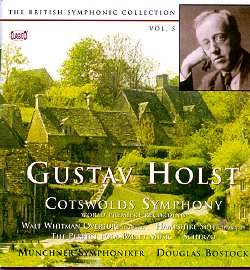
One of the most impressive concerts I've attended lately was Douglas Bostock's
debut with the Royal Liverpool Philharmonic during this year's Kings Lynn
Festival. Bostock conducted a white-hot interpretation of Nielsen's 5th Symphony
which fortunately was recorded by ClassicO (along with Nielsen's
2nd Symphony) the day after the concert. If that recording manages
to capture some of the intensity that made the concert performance so
electrifying, than I suspect Bostock will be reaping a considerable amount
of praise for his first recording (that I know of) with a front-rank British
orchestra. Most of his recordings for the ClassicO label have featured regional
German and Czech orchestras including his recent series of British music
recordings using the Munich Symphony Orchestra. That series has been warmly
received but critics have not ignored the often variable playing of the Munich
band. His recent recording of the Bax 6th Symphony showed tremendous
insights into the music but was let down by an orchestra that was technically
challenged beyond its abilities. This Holst disc is more successful due largely
to the nature of the music which is smaller-sized and less virtuosic than
the Bax. Nevertheless, I hope Bostock's new association with the RLPO means
he'll be using that orchestra for his future recordings of British music.
Having said all that, I will admit that the Munich Symphony play very well
in this new recording. The fact that they sound so much at home in these
early works by Holst isn't surprising considering how much early Holst sounds
like Wagner, Dvorak and Mendelssohn; the bread and butter of any Central
European Orchestra. Bostock has assembled a terrific program combining several
of Holst's earliest scores with two of his later masterworks thus allowing
listeners a remarkable opportunity to witness how Holst developed from a
promising talent into a great composer. Both the Cotswolds Symphony
and the Walt Whitman Overture are given world première recordings
although the symphony's beautiful second movement, Elegy (In Memoriam
William Morris), has been recorded before. The third work on the disc
is the Hampshire Suite which is actually Holst's popular Suite in
F for military band in an arrangement for orchestra made by Gordon Jacob.
Bostock conducts a very colorful performance of The Perfect Fool Ballet Music
and then concludes his program with the Scherzo for Orchestra from the unfinished
symphony that Holst was working on at the time of his death in 1934.
It took a little time for me to warm up to the early symphony and overture
simply because they don't sound anything like the mature Holst I love.
Nevertheless, these are pleasurable pieces which Bostock and his players
invest with vigor and charm. The Hampshire Suite is very successful
in its orchestral arrangement and would be a guaranteed crowd-pleaser if
heard in concert. Bostock's performances of the Perfect Fool Ballet Music
and Scherzo show him to be in complete sympathy with Holst's
distinctive sound world although it is in these later works where the limitations
of the Munich Symphony are most apparent. They simply aren't a match for
the London Philharmonic which sounds fuller and more refined in their recordings
of these same works with Sir Adrian Boult. ClassicO does provide a spacious
and natural recording which is a huge improvement on their earlier very
dry-sounding Bax disc.
My final verdict is that this disc is well worth its price and should be
in the library of any serious collector of 20th Century British
music. The program is enjoyable and Bostock again shows us what a versatile
and inspired conductor he is. I look forward to his up-coming recordings
with the Royal Liverpool Philharmonic.
Reviewer
Richard R. Adams
 (four
stars for sound and performance)
(four
stars for sound and performance)
The
British Symphonic Collection
